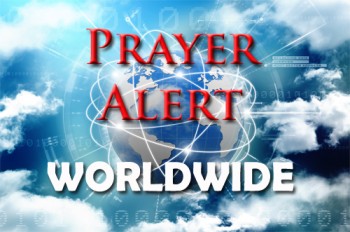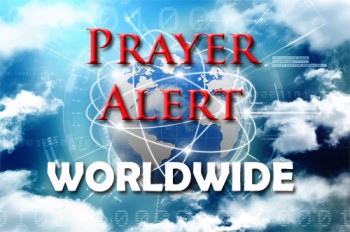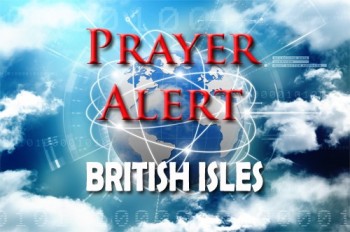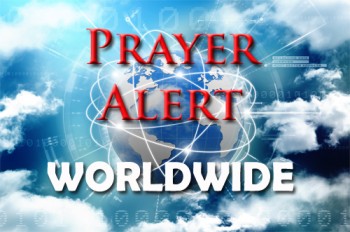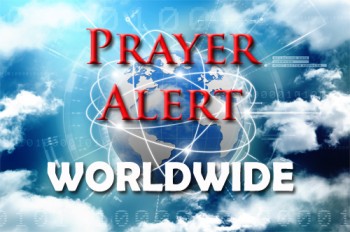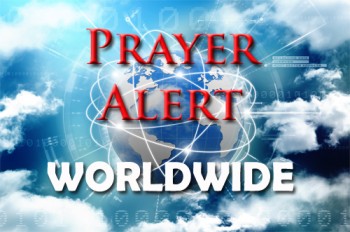Displaying items by tag: Asia
Global: terrorism - 1
Following New Zealand’s terror attack, there have been six recorded incidents in just seven days. In Israel two rockets launched from Gaza terrorised residents around Tel Aviv; explosions and sirens were heard throughout the region. Palestinian terror group Islamic Jihad claimed responsibility. Two Israelis were killed in another terror attack, and two days later a shooting attack on an Israeli bus traumatised passengers. In the Netherlands a gunman opened fire inside a tram, killing three and injuring others. In Kashmir 44 soldiers were killed and dozens injured by Pakistan terrorists. In Stanwell, UK, a far-right terrorist was arrested for attempted murder and racially aggravated public order. American experts say white nationalist threats are growing. Prayer leader Brian Mills says, ‘Satan undermines truth, is full of self-importance, is vehemently anti-Jewish and anti-Christian, seeks to interrupt our communication with God, and is a terrorist! We see a spirit of violence, intrinsic within Islam, being turned outwards.’
Global: terrorism - 2
A few militants defending a Syrian river bank are all that is left of IS’s ‘caliphate’. 40,000 foreigners from 110 countries joined it; many have gone home, creating security challenges. Thousands are in Kurdish detention camps awaiting relocations. Distinguishing between regretful and repentant hangers-on and truly dangerous fighters is a legal and political nightmare, creating relationship cracks between Europe and US. Meanwhile IS’s black flag flies over an enclave on the Philippine island of Basilan, where a cathedral was bombed. IS-linked groups are still active in Nigeria, Sudan, Pakistan, India, Indonesia, Bangladesh, and stretches of northern Africa and the Sahel. While they may not have access to the oil revenues that enabled IS to claim to be an actual state, they remain a security threat. IS is also alive and well on the web, with gruesome and well-produced propaganda.
Afghanistan: costs of war and peace
On 12 March, the US and Taliban finished their longest set of talks to date. After sixteen days of negotiating, the US special representative for Afghanistan reconciliation tweeted, ‘Peace requires agreement on four issues: counter-terrorism assurances, troop withdrawal, intra-Afghan dialogue, and a comprehensive ceasefire. We’re now “agreed in draft” on the first two.’ This is a positive development; previously they had only ‘agreed in principle’. The next step is for them to consult with decision-makers for approval of the draft agreement so that it can be finalised. This would pave the way for direct talks between the Taliban and the Afghan government, to address remaining issues. However, these talks have not involved the government, so President Ashraf Ghani’s administration is feeling excluded and suspicious.
Nepal: God heals miraculously
Pastor Biju stopped to pray with 18-year-old deaf mute Tilak, who belongs to an unreached, unengaged people group. As he stretched out his arm to pray for him, he saw confusion in the boy’s eyes. Tilak had no way of communicating with others, and no context for what was about to happen. Pastor Biju gave Tilak a reassuring smile before he closed his eyes and focused his attention heavenward. He prayed for deliverance and healing, and as he did, he felt Tilak jerk away. The bewildered look on his face showed that something amazing had happened. Tilak was instantaneously, miraculously healed! Tears streamed down his face as he heard through his ears for the first time. He rushed to his mother, who heaved sobs of joy and relief. Her boy was healed, and it was all because of Jesus! The entire family became Christians that day.
Terror-inciting Tamimi to come to Britain
Ahed Tamimi is a Palestinian provocateur who slapped Israeli soldiers while her mother filmed the incident and then sent film to the media. She later said, ‘The world should not panic or be appalled by a Palestinian slapping an IDF soldier. Everyone should do it, not just me.’ With such comments, she and her family incite suicide bombings and stabbings. She is to come to Britain for a three-month crash course in the English language. Tamimi says she is on ‘the path of the martyrs’ who are not aiming for a two-state solution, but for ‘the liberation of Palestine’, and for ‘Jerusalem to be the eternal capital of Palestine’. Jeremy Corbyn supports her, and Labour MPs have been lectured by her father inside the UK parliament. In an interview with Jordanian media she said that after her crash course in English she will visit her brother in Palestine when he is freed from prison, then return to the UK to study international law. See
Indigenous Malays open to the Gospel
The indigenous Malaysian Church has tremendous potential for outreach to the Malays, but is fearful of authorities clamping down on them. Historically there is deep-seated resentment between the Chinese and Malays because of the favoured status of the Malays. However, many Chinese believers are now being trained in ministry to Muslims. Also, the kidnapping of Chinese pastor Raymond Koh two years ago has changed things. His whereabouts are unknown, but his ordeal has inspired the Church to intercede for him. While they pray for him, they also pray for the Gospel to grow in Malaysia. Now workers say that more Muslim Malays are receiving prayer for healing, and there is a cautious readiness to hear Christians talking about ‘Isa.’
Israel: could Netanyahu form a government?
Elections are on 9 April and a new poll, taken after the attorney general said he would indict prime minister Benjamin Netanyahu on corruption charges, shows that he could not form a right-wing government if elections were held today. 68% of the public want him to resign now or after he is formally indicted. Following the announcement of pending indictments for bribery, fraud, and breach of trust through receiving gifts from supporters, and alleged media collusion to give him favourable coverage in return for political and regulatory favours, Netanyahu’s response was a combative speech declaring the investigation a left-wing witch hunt to aid the election of his primary rivals - the Blue and White party The poll currently gives Blue and White 37 seats and Likud 29. Netanyahu holds the record for the longest sitting single term of any Israeli prime minister.
India and Pakistan: violent peace
War would be terrible for India and Pakistan, but for the people of Kashmir peace sounds like the same thing. Shelling has increased along the official Line of Control that divides Kashmir between the two nuclear-armed rivals. Indian and Pakistani warplanes occasionally roar overhead, and troops from both sides shoot at each other across the de facto border. Frightened people are praying that it doesn’t escalate into war. Mohammed Shafiq lives on the Pakistani side and built bunkers near his home years ago for just such an occasion. ‘We will use them if there is any attack from India in our area.’ Meanwhile JeM, a Pakistan terrorist group whose primary motive is to separate Kashmir from India and merge it with Pakistan, is accused of aggravating the situation with violent attacks in Kashmir. Although banned, JeM continue to operate there. See
Iraq: Yazidi captives come home
21 Yazidis who were held by IS have returned home to Iraq from Syria. Most are children, young boys who were held by IS for five years and whom experts believe were likely to have been forcibly trained in IS military camps. The parents of many of these children remain missing. Yazidis are an ethnic religious group. IS targeted both Christians and Yazidis for genocide, although Yazidis were far more heavily targeted for enslavement and captivity. The effect of IS on the children of both groups is profound. Many suffer deep psychological trauma, and were denied the opportunity of childhood. With an entire generation impacted by genocide, many Christian and Yazidi leaders are concerned about the future. The brutality of IS across both Iraq and Syria has left behind deep scars, and has decimated the religious minorities who once lived in these countries.
North Korea: activity at missile site
The satellite launch facility at Tongchang-ri became dormant last August. Now satellite images show that rebuilding efforts began between 16 February and 2 March - either just before, during or immediately after Kim Jong-Un and Donald Trump abruptly ended their second summit on 28 February without signing a deal. Though the satellite images provide useful information, analysts and experts express caution against reading too much into them without sufficient intelligence to complement. Amid much media and ‘professional’ speculation, a senior research associate at the Centre for Nonproliferation Studies said, ‘It's possible that the activity at the facility is a chess move in North Korea's negotiating strategy to ratchet up pressure on Washington. The site, in the macro-sense, is very transparent and the North Koreans know we are always watching.’
